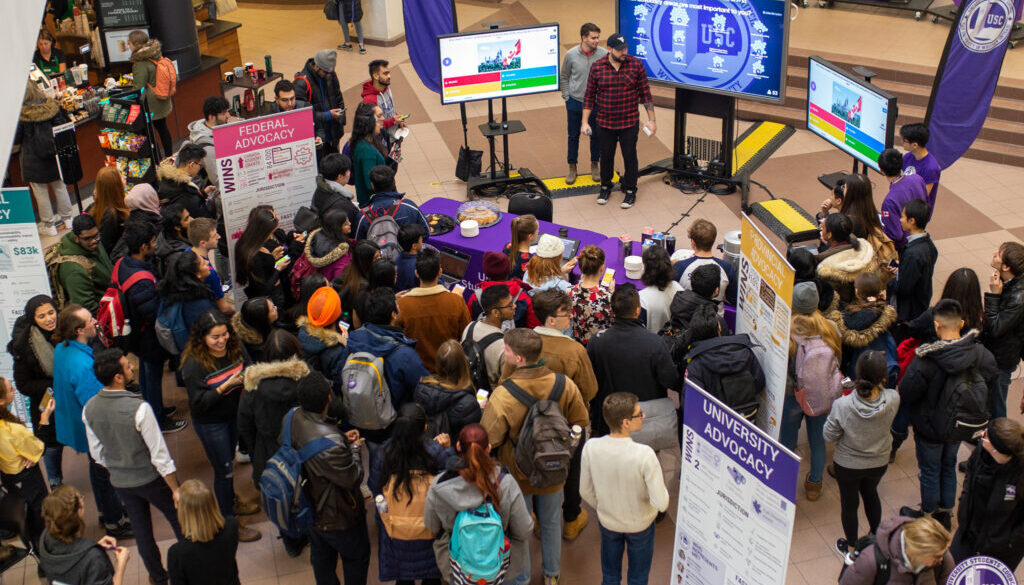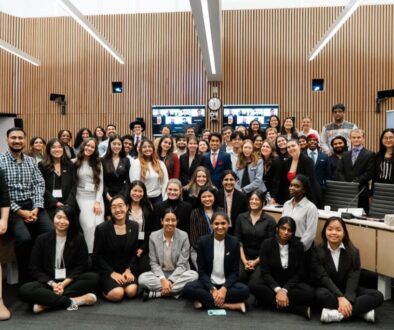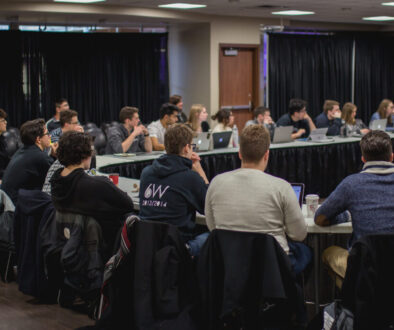Advocacy Week culmination of years of hard work by USC Vice President Cat Dunne
Three years ago, USC Vice President Cat Dunne would never have pictured herself leading a week-long advocacy conference at Queen’s Park as the President of an alliance of university student associations across Ontario.
“It’s honestly surreal being able to lead OUSA and lobby elected representatives and stakeholders from across Ontario with the goal of influencing policy that makes our post-secondary system more accessible, affordable, and accountable.”
OUSA – the Ontario Undergraduate Student Alliance – brings together eight student associations and over 150,000 university students from around the provinces. Dunne was elected President of organization in May.
Dunne’s experience with student government began midway through her second year when a friend encouraged her to apply for a research intern role in the Advocacy and Government Services Department of the USC. Working as an RA at the time in Saugeen-Maitland Hall, she remembers a colleague forcing her to complete the application, insisting she would be an ideal candidate for the position.
“In hindsight, I’m so happy they made me apply, because it has led to an incredible journey at the USC that has shaped not just my professional ambitions, but also my personal values.”
Dunne worked as an associate in the Vice President’s portfolio in her third and fourth years, and also worked as a summer research intern at OUSA, before winning a general election with running-mate Bardia Jalayer last winter to become the 2019/20 USC Vice President. Dunne’s combined experience makes her one of the most experienced and qualified student leaders in USC history.
For the last 15 years, each November, OUSA sends a delegation of student leaders from student associations across the province to Queen’s Park for a full week of meetings with MPPs, staffers, and sector stakeholders. When it was all said and done, four teams of four student leaders completed over 60 meetings. USC President Bardia Jalayer also attended to represent the USC.
This year, OUSA focused on four advocacy priorities: student mental health, sexual violence prevention and response, student financial aid, and preparing students for the workforce.
(Editor’s note: links to the brief are available at the bottom of this article)
The Advocacy Conference began well before the first meeting on Monday morning. “OUSA’s Steering Committee set our organization’s priorities at the summer StratCon (strategy conference) based on the issues they were seeing at their local campuses,” Dunne explained, “then we put together comprehensive advocacy briefs that are informed by student feedback and leading research in the sector.”
Dunne explained that student authors and researchers, with support from OUSA’s full-time office staff, work together to prepare papers that make up OUSA’s policy library and background materials for the lobbying that takes place at Advocacy Conference.
The student delegation met on Sunday ahead of the week to review the advocacy briefs, coordinate lobbying strategy, and complete a series of role-play exercises to practice lobbying the province’s senior politicians.
“Some of our delegates have never lobbied before in their life so we do lots of prep to ensure that everyone feels comfortable and confident going into their first meeting,” Dunne said. Still, she admitted, nothing really prepares student leaders for the mix of nerves and excitement they feel the first time they get to engage with decision makers, while fighting for better policy in the sector.
Dunne described every day of Advocacy Conference as action-packed. All teams meet early each morning at the group’s “headquarters” at the nearby University of Toronto campus. From there, the group breaks apart and each team conducts four to five meetings throughout the day in the Legislative building.
Some of Dunne’s meetings included the Minister of Colleges and Universities Ross Romano, Parliamentary Assistant to the Minister of Colleges and Universities David Piccini, London North Centre MPP Terence Kernaghan, London West MPP Peggy Sattler, Government House Leader Paul Calandra, and former Premier Kathleen Wynne.
Dunne remarked that she was most surprised with the support she received from all politicians and stakeholders, regardless of party, on the student-related issues the group brought to the table.
“I wasn’t expecting everyone to recognize the importance of student advocacy as much as they did,” she said, “it was really refreshing to realize that we found at least some common ground with everyone we met with on virtually every issue we discussed.”
“Politicians and staffers are just people,” she added, “it also helps that everyone has some connection to the sector, whether they have kids who are currently attending university, family members working at an institution, or are a graduate themselves, I think they understand how critical education is to our province.”
Dunne’s only disappointment from the week was realizing the work still required to achieve gender parity at decision making tables.
“I was often the only woman in the meetings, which all had at least five attendees,” she explained, “if I wasn’t in the room, there would have been a table of only men talking about how to tackle gender-based violence on university campuses – an issue that disproportionately impacts women.”
Dunne unapologetically identifies as a feminist and is known within the USC to be a champion of exposing issues of gender-based violence at Western and across the province. She acknowledged that the lack of gender equality was not limited to politicians and staffers, but student leaders as well. On this issue, Dunne stressed the importance of supporting female leaders on university campuses, and in student governments as a first step to addressing a societal problem.
One of the best feelings of the week was seeing numerous familiar faces around the halls of Queen’s Park, according to Dunne. Former USC executives Allie Adamo, Lindsee Perkins, and Emily Addison all took time to chat with the current executives. Perkins, now a staffer in the Ministry of Natural Resources and Forestry, participated in OUSA’s Advocacy Week herself in 2015. Dunne and Jalayer also connected with former USC councillors Kieran Lawler and Misha Apel, who are currently interns in the Ontario Legislative Internship Program. Most notably, Jalayer had the opportunity to meet with Education Minister Stephen Lecce, who served as USC President in 2008/09.
“Seeing USC alumni in these influential roles shows the incredible development opportunity student government positions offer young leaders like us,” Dunne remarked.
In her concluding reflection on the week, Dunne added: “it’s an incredible feeling to realize that the past six months of work have actually been building to something that will have a real impact on our students’ lives.”
The USC is always looking for feedback from students to guide advocacy positions. If you have something to share about your university experience, contact Vice President Cat Dunne at vicepresident@westernusc.ca.
Check out OUSA’s advocacy briefs here:





